|
|
|
Sort Order |
|
|
|
Items / Page
|
|
|
|
|
|
|
| Srl | Item |
| 1 |
ID:
105912
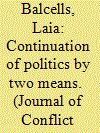

|
|
|
|
|
| Publication |
2011.
|
| Summary/Abstract |
This article distinguishes between ''direct'' and ''indirect'' violence during civil wars. These two types differ in their forms of production: while indirect violence is unilaterally perpetrated by an armed group, direct violence is jointly produced by an armed group and civilians, and it hinges on local collaboration. These differences have consequences for the spatial variation of each of these types: in conventional civil wars, indirect violence is hypothesized to be positively associated with levels of prewar support for the enemy group; in contrast, direct violence is hypothesized to increase with the level of political parity between factions in a locality. The predictions are tested with a novel dataset of 1,710 municipalities in Catalonia and Aragon during the Spanish civil war (1936-1939).
|
|
|
|
|
|
|
|
|
|
|
|
|
|
|
|
| 2 |
ID:
105913
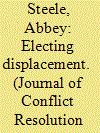

|
|
|
|
|
| Publication |
2011.
|
| Summary/Abstract |
This article highlights a nefarious effect of elections during civil wars by demonstrating that they can facilitate the displacement of civilians. In contrast to the perception of displacement as haphazard, the author argues that armed groups displace strategically when they attempt to gain control over a territory, and where they have information about civilians' loyalties. Although inferring preferences is difficult in the context of civil wars, elections conducted before or during a violent conflict are one way that armed groups can identify local cleavages and ''disloyal'' residents. The author tests implications of the argument with original, microlevel quantitative and qualitative data from northwest Colombia. Using voter files and disaggregated electoral returns, the author shows that residents in urban neighborhoods that supported the insurgent-backed political party, the Patriotic Union (UP), were more likely to leave the city of Apartadó than were neighbors in other districts. However, residents of the nearby rural communities that supported the UP were the least likely to leave. The author traces the patterns of violence across the communities using local archival materials and interviews to assess how well the argument accounts for the variation observed, and to explore the unexpected outcome in the rural area. While the author finds that counterinsurgents attempted strategic displacement in both the city and the mountains, they only succeeded in the urban areas because residents of the rural hamlets were uniquely able to overcome the collective action problem that strategic displacement generates. The findings demonstrate that political identities are relevant for patterns of violence, and that cleansing occurs even in nonethnic civil wars.
|
|
|
|
|
|
|
|
|
|
|
|
|
|
|
|
| 3 |
ID:
105909
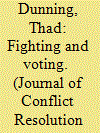

|
|
|
|
|
| Publication |
2011.
|
| Summary/Abstract |
Two recent research programs-one on the sources of democratic consolidation and another on the causes and consequences of violent conflict-have tended to evolve in relative isolation. The contributions to this special issue of Journal of Conflict Resolution help to bridge this gap, through explicit theoretical and empirical analysis of the relationship between fighting and voting. Armed conflict and electoral politics may be strategic substitutes, in that political actors may optimally choose to submit to the ballot box or instead attempt to impose their will by force; or they may be strategic complements, in that actors use violence to bolster their electoral aims, or use electoral returns as sources of information on underlying preferences that they exploit in armed campaigns. In either case, the distribution of popular support for contending parties can shape not only the incidence but also the type of armed conflict, and it can also influence the incentives of parties to invest in institutional mechanisms that mitigate commitment problems and help to bring violent conflicts to an end. The contributions to this issue illuminate these themes and demonstrate the value of bringing these separate research programs into closer dialogue.
|
|
|
|
|
|
|
|
|
|
|
|
|
|
|
|
| 4 |
ID:
105914
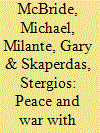

|
|
|
|
|
| Publication |
2011.
|
| Summary/Abstract |
We explore how peace or war can occur in the presence of commitment problems. These problems can be reduced by institutions of good governance or, alternatively, state capacity which (a) can be considered a collective good and (b) can be improved through investments. We show how the likelihood of a peace agreement depends on the level of state capacity and on investments in state capacity made by adversaries. In accordance with existing evidence but contrary to various theories of conflict, we find that income levels unambiguously increase the chance of peace. Among other issues, we discuss the critical role of external actors in encouraging or discouraging commitment and in developing good governance institutions.
|
|
|
|
|
|
|
|
|
|
|
|
|
|
|
|
| 5 |
ID:
105910
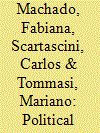

|
|
|
|
|
| Publication |
2011.
|
| Summary/Abstract |
In this article, the authors argue that where institutions are strong, actors are more likely to participate in the political process through institutionalized arenas, while where they are weak, protests and other unconventional means of participation become more appealing. The authors explore this relationship empirically by combining country-level measures of institutional strength with individual-level information on protest participation in seventeen Latin American countries. The authors find evidence that weaker political institutions are associated with a higher propensity to use alternative means for expressing preferences, that is, to protest.
|
|
|
|
|
|
|
|
|
|
|
|
|
|
|
|
| 6 |
ID:
105915
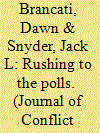

|
|
|
|
|
| Publication |
2011.
|
| Summary/Abstract |
In the post-cold war period, civil wars are increasingly likely to end with peace settlements brokered by international actors who press for early elections. However, elections held soon after wars end, when political institutions remain weak, are associated with an increased likelihood of a return to violence. International actors have a double-edged influence over election timing and the risk of war, often promoting precarious military stalemates and early elections but sometimes also working to prevent a return to war through peacekeeping, institution building, and powersharing. In this article, we develop and test quantitatively a model of the causes of early elections as a building block in evaluating the larger effect of election timing on the return to war.
|
|
|
|
|
|
|
|
|
|
|
|
|
|
|
|
| 7 |
ID:
105911


|
|
|
|
|
| Publication |
2011.
|
| Summary/Abstract |
The conventional wisdom is that for a democracy to be consolidated, all groups must have a chance to attain power. If they do not, then they will subvert democracy and choose to fight for power. In this article, the authors show that this wisdom is seriously incomplete because it considers absolute, not relative payoffs. Although the probability of winning an election increases with the size of a group, so does the probability of winning an armed conflict. Thus, in a situation in which all groups have a high chance of winning an election, they may also have a high chance of winning a fight. Indeed, in a natural model, the authors show that democracy may never be consolidated in such a situation. Rather, democracy may only be stable when one group is dominant. The authors explore this key aspect of the theory using data from La Violencia, a political conflict in Colombia during the years 1946-1950 between the Liberal and Conservative parties. Consistent with their results, and contrary to conventional wisdom, the authors show that fighting between the parties was more intense in municipalities where the support of the parties was more evenly balanced.
|
|
|
|
|
|
|
|
|
|
|
|
|
|
|
|
|
|
|
|
|